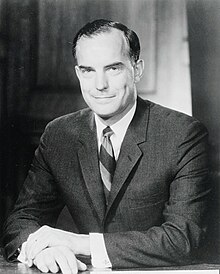
Mark Odom Hatfield was an American politician and educator from the state of Oregon. A Republican, he served eight years as Governor of Oregon, followed by 30 years as one of its United States senators, including time as chairman of the Senate Appropriations Committee. A native Oregonian, he served in the United States Navy in the Pacific Theater during World War II after graduating from Willamette University. After the war he earned a graduate degree from Stanford University before returning to Oregon and Willamette as a professor.

William Victor Roth Jr. was an American lawyer and politician from Wilmington, Delaware. He was a veteran of World War II and a member of the Republican Party. He served from 1967 to 1970 as the lone U.S. Representative from Delaware and from 1971 to 2001 as a U.S. Senator from Delaware. He is the last Republican to serve as and/or be elected a U.S. Senator from Delaware.
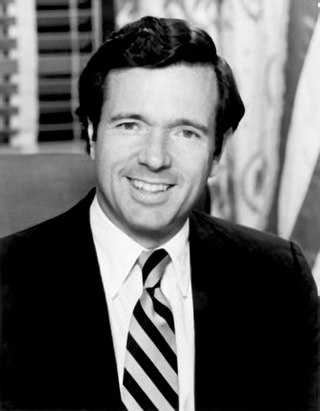
Henry John Heinz III was an American businessman and politician who served as a United States senator from Pennsylvania from 1977 until his death in 1991. An heir to the Heinz family fortune, Heinz entered politics in 1971 when he won a special election to replace Robert Corbett to represent Pennsylvania's 18th congressional district. In 1976, Heinz ran to replace retiring Senate Minority Leader Hugh Scott. Heinz narrowly won in the primary over future Senator Arlen Specter, and defeated William Green III. Heinz won re-election in 1982 and 1988 by large margins. On April 4, 1991, Heinz was killed when his plane, facing mechanical problems, collided with a helicopter inspecting the plane, killing all involved in the crash.
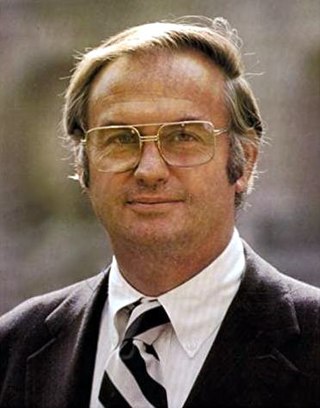
Lowell Palmer Weicker Jr. was an American politician who served as a U.S. Representative, U.S. Senator, and the 85th Governor of Connecticut.

Michael Edward Lowry was an American Democratic Party politician who served as the 20th governor of Washington from 1993 to 1997. His political career ended abruptly following a sexual misconduct allegation made against him by his deputy press secretary, Susanne Albright. Lowry served as a United States Representative from Washington's 7th congressional district from 1979 to 1989.
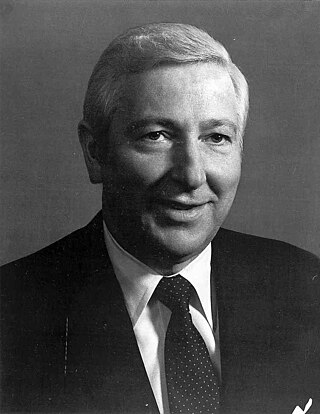
John Dennis Spellman was an American politician who served as the 18th governor of Washington from 1981 to 1985 and as the first King County Executive from 1969 to 1981.
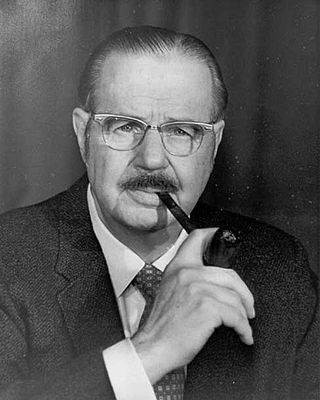
Hugh Doggett Scott Jr. was an American politician. A member of the Republican Party, he represented Pennsylvania in the U.S. House of Representatives from 1941 to 1945 and from 1947 to 1959 and in the U.S. Senate, from 1959 to 1977. He served as Senate Minority Leader from 1969 to 1977.

Jacob Koppel Javits was an American lawyer and politician. During his time in politics, he represented the state of New York in both houses of the United States Congress. A member of the Republican Party, he also served as the state's Attorney General. Generally considered a liberal Republican, he was often at odds with his own party. A supporter of labor unions, the Great Society, and the civil rights movement, he played a key role in the passing of civil rights legislation. An opponent of the Vietnam War, he drafted the War Powers Resolution in 1973.

George David Aiken was an American politician and horticulturist. A member of the Republican Party, he was the 64th governor of Vermont (1937–1941) before serving in the United States Senate for 34 years, from 1941 to 1975. At the time of his retirement, he was the most senior member of the Senate, a feat which would be repeated by his immediate successor Patrick Leahy.

Thomas Henry Kuchel was an American politician. A moderate Republican, he served as a US Senator from California from 1953 to 1969 and was the minority whip in the Senate, where he was the co-manager on the floor for the Civil Rights Act of 1964 and the Voting Rights Act of 1965. Kuchel voted in favor of the Civil Rights Acts of 1957, 1960, and 1964, as well as the 24th Amendment to the U.S. Constitution, the Voting Rights Act of 1965, and the confirmation of Thurgood Marshall to the U.S. Supreme Court, while Kuchel did not vote on the Civil Rights Act of 1968.

James Lane Buckley was an American politician and judge who served in the United States Senate as a member of the Conservative Party of New York State in the Republican caucus from 1971 to 1977 and additionally held multiple positions within the Reagan administration. He was also the Republican nominee in the 1980 Connecticut Senate race, but he was defeated by Democrat Chris Dodd.

Robert Walter "Bob" Kasten Jr. is an American Republican politician from the state of Wisconsin who served as a U.S. Representative from 1975 to 1979 and as a United States Senator from 1981 to 1993.

John Lester Hubbard Chafee was an American politician and officer in the United States Marine Corps. A member of the Republican Party, he served as the 66th Governor of Rhode Island, as the Secretary of the Navy, and as a United States Senator.

The 1968 United States Senate elections were elections for the United States Senate. Held on November 5, the 34 seats of Class 3 were contested in regular elections. They coincided with the presidential election of the same year. The Republicans picked up five net seats in the Senate. This saw Republicans win a Senate seat in Florida for the first time since Reconstruction.
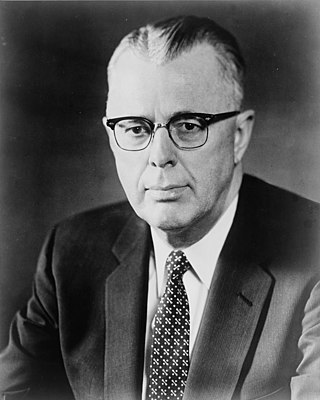
Norris Henry Cotton was an American politician from the state of New Hampshire. A member of the Republican Party, he served as a U.S. Representative and subsequently as a U.S. Senator.

Lyman Trumbull was an American lawyer, judge, and politician who represented the state of Illinois in the United States Senate from 1855 to 1873. Trumbull was a leading abolitionist attorney and key political ally to Abraham Lincoln and authored several landmark pieces of reform as chair of the Judiciary Committee during the American Civil War and Reconstruction era, including the Confiscation Acts, which created the legal basis for the Emancipation Proclamation; the Thirteenth Amendment to the United States Constitution, which abolished chattel slavery; and the Civil Rights Act of 1866, which led to the Fourteenth Amendment to the United States Constitution.

Milton Ruben Young was an American politician, most notable for representing North Dakota in the United States Senate from 1945 until 1981. At the time of his retirement, he was the most senior Republican in the Senate, and the last member of the Lost Generation to serve in the Senate.

The 1983 United States Senate special election in Washington was a special election to fill the seat which had been held by longtime Senator Henry Jackson, who unexpectedly died on September 1. Three-term former governor Dan Evans was appointed by Governor John Spellman on September 8, and he won the special election over congressman Mike Lowry on November 8. Jackson had won a sixth term the previous year, so more than five years remained in the term.
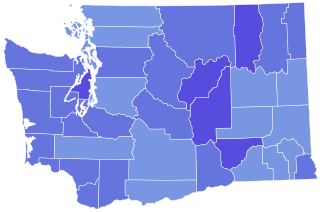
The 1956 United States Senate election in Washington was held on November 6, 1956. Incumbent Democratic U.S. Senator Warren Magnuson won a third term in office, defeating Republican nominee Arthur B. Langlie.

The 1952 Washington gubernatorial election took place on November 4, 1952, between incumbent governor Arthur B. Langlie of the Republican Party and U.S. Representative Hugh Mitchell of the Democratic Party. Langlie won the general election, becoming the first Washington state governor to be elected to a third term.
